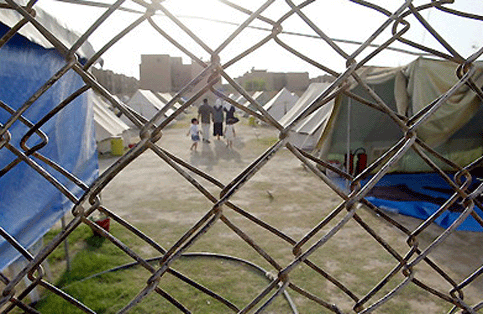IRIN 19 June 2003

Fenced in: A Palestinian family walks back to their tent at a makeshift refugee camp, formerly housing the Palestinan Sports Club, in Baghdad (Photo: AFP/Timothy A. Clary, 2003)
BAGHDAD - Haifa Sports Club used to be a Palestinian cultural centre in Baladiyat in northeastern Baghdad. The Palestinian flag flies high with a sign next to it saying “No to settlements and yes to the right of return”. But since the fall of Saddam Hussein, some Palestinians have found themselves discriminated against and homeless. Now the club has been turned into an informal refugee camp to accommodate about 250 families.
“Right after the war, the Iraqi landlord came to the flat and forced me and my husband to leave the house we lived in for more than 25 years,” Subhiyah Abd al-Qadir told IRIN from a dusty tent set up on the soccer pitch at the club. The Palestinian added that some of the other families in neighbouring tents had landlords threatening them with guns to empty their flats immediately and leave.
“We sold our furniture, we left some of our stuff behind and took whatever we took quickly and put it here in the club in some rooms,” she said.
Subhiyah has painfully swollen legs from sleeping on the ground as summer temperatures soar. At night she is plagued by mosquitoes. With intermittent supplies of water and electricity conditions in the camp are rapidly deteriorating. Muhammed Nafi, who lives in one of the tents, put a wet towel in front of his fan to ease the hot breeze. Like many families in Baghdad now following the war, Nafi lost his job in a printing house, and he and his family live on the salary of his wife, who works as a teacher.
David Bellamy, the UNHCR representative in Baghdad, told IRIN that some Palestinians in Iraq were victims of post-conflict turbulence along with other minorities. He added that Palestinians in Iraq were in a vulnerable position now, because there is little in the way of external support for the group. “Only Palestinians in Lebanon, Syria, Jordan, Israel, and Egypt get help from UNHCR,” he added.
All the Palestinian families currently homeless in Baghdad had been living in apartments rented to them by the Ministry of Social Affairs for less than US $1 per week; this reportedly caused resentment among some Iraqis, who have to pay many times this amount in rent.
The Palestinian community in Iraq is well established. Muhammad Salih al-Maddi, head of the Council of Palestinian Families in Baghdad, told IRIN about 35,000 Palestinians had sought refuge in Iraq after the 1948 Arab-Israeli war, and a similar number came from Jordan, Lebanon, and Kuwait and Gaza following conflict in those countries. Al-Maddi believes that Iraq’s Palestinian refugees did not really enjoy special privileges during Saddam’s regime and that Saddam had embraced them primarily to gain kudos in the Arab and Islamic world.
Although Palestinians in Iraq have the right to work and own property, many of them ended up in there after being expelled from other Arab countries. Many have told of discrimination in the job market. “They [Palestinians] don’t own much, with many living two or three families together in a flat,” Al-Maddi told IRIN. He added that the Iraqi government would grant other Arab citizens Iraqi nationality but withhold it from Palestinians, who still had travel documents after so many years in the country.
UNHCR has offered many tents to the Palestinian Red Crescent and the Iraqi Red Crescent, who rapidly established the refugee camp in the sports club. It also offered blankets, rubbish bins, and other items, and is giving free lifts to young women and girls too frightened to travel alone to schools and universities.
“We raised the issue with the US-led administration, as the situation is the most difficult the Palestinians have faced since they arrived to this country,” Bellamy said. “We identified some 400 apartments in the Baladiyat area, and we’re negotiating with the Coalition administration and the Ministry of Social Affairs to give them to the Palestinians,” he added. UNHCR is continuing its programme begun in May 2002 as a long-term solution to allocate Palestinians grants and land to build more permanent accommodation.
IRIN-Asia, Tel: +92-51-2211451, Fax: +92-51-2292918, Email: IrinAsia@irin.org.pk
This item is delivered to the “Asia-English” Service of the UN’s IRIN humanitarian information unit, but may not necessarily reflect the views of the United Nations. For further information, free subscriptions, or to change your keywords, contact e-mail: IRIN@ocha.unon.org or Web: www.irinnews.org. If you re-print, copy, archive or re-post this item, please retain this credit and disclaimer. Reposting by commercial sites requires written IRIN permission.